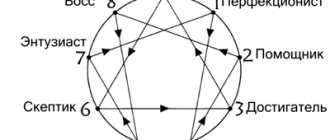- EPI Test: General Information
- Take the Eysenck temperament test
- Decoding EPI test results
Temperament types are one of the most famous personality typologies. Even those who are very far from psychology know about the existence of sanguine people, phlegmatic people, choleric people and melancholic people. And one of the most famous temperament tests
can be called
the Hans Eysenck personality questionnaire , or Eysenck Personality Inventory - EPI . You can take this test online on our website – it is presented below.
Content
- 1 Description of the technique
- 2 History of creation 2.1 The first MMQ personality questionnaire
- 2.2 Second MPI Personality Inventory
- 2.3 Third EPI Personality Inventory
- 2.4 EPQ Fourth Personality Questionnaire
- 4.1 MPI key
- 5.1 MPI
- 6.1 Extraversion - introversion
- 7.1 According to Eysenck
- 8.1 Text of the MPI questionnaire
Eysenck test
The test taker is asked to answer 57 questions that simulate various life situations and are aimed at identifying the usual way of behavior for a given individual in these situations. The answer is “yes” or “no” (respectively “+” or “-” ), reflecting the first “natural” answer to each question that comes to mind.
This questionnaire also contains a kind of “safety net” - some of the indicators indicate insincerity in the answers, as well as some tendency towards demonstrative behavior. Such people are more focused on external approval than on introspection.
Interpretation of test results
When interpreting test results, a list of psychological characteristics is used, which are plotted on a coordinate system inscribed in a circle. The degree of expression of each personality trait is examined separately .
During the interpretation of the test results, the distance of the indicator value from the center of the circle is also assessed, since the degree of distance indicates the level of deviation of this parameter from the average value.
The author of the methodology believed that the strong and weak personality types identified by I.P. Pavlov are quite close in essence to the extroverted and introverted types of temperament.
History of creation
The first MMQ personality questionnaire
MMQ
(Maudsley Medical Questionnaire, from the name of the clinic where Eysenck worked) - a technique proposed in 1947. It was intended to diagnose neuroticism. The questionnaire consists of 40 statements with which the subject is asked to agree (yes) or disagree (no).
Statements were selected from questionnaires already known by that time, and the author relied on clinical descriptions of neurotic disorders. The MMQ was standardized on the basis of a survey of two groups: “neurotics” (1 thousand people) and “normal” (1 thousand people). A detailed analysis of the responses received for each MMQ statement (taking into account differences in psychiatric diagnoses) showed that using the questionnaire, two types of neurotic disorders can be differentiated - hysterical and dysthymic. Based on these results, G. Eysenck suggested that the answers to the MMQ statements will make it possible to draw a conclusion about the position of the subject on the scale of another personality dimension postulated by this researcher - extraversion - introversion. This began work on the construction of a new personality questionnaire. As a result, the MMQ did not find any use in psychodiagnostic research.
Second MPI Personality Inventory
MPI
(Maudsley Personality Inventory) is a personality questionnaire published in 1956. It consists of two internal scales: extraversion-introversion and neuroticism, with 24 questions for each scale. Later, 2 empty “masking questions” and 20 questions were also added to form a scale of the subject’s sincerity. There are three answer options: Yes (2 points), Don't know (1 point) and No (0 points). Practical use of MPI has shown significant discrepancies between the data obtained and the author's theoretical predictions (especially in clinical groups).
Third Personality Inventory EPI
EPI
(Eysenck Personality Inventory) was published in 1963 and contains 57 questions, 24 of which are aimed at identifying extraversion-introversion, 24 others - at assessing emotional stability-instability (neuroticism), the remaining 9 constitute a control group of questions designed to assess the sincerity of the subject , its relationship to the survey and the reliability of the results.
G. Eysenck developed two versions of this technique (A and B), which differ only in the text of the questionnaire. The instruction, key and data processing are duplicated. The presence of two forms allows the psychologist to conduct repeated research.
Adapted in Russia by A.G. Shmelev.
EPQ Personality Questionnaire Four
EPQ
(Eysenck Personality Questionnaire) is the result of further research work by Hans and Sibylle Eysenck. The EPQ was created in 1968 based on the PEN (Psychoticism, Extraversion, and Neuroticism) model proposed by the authors. Thus, a third factor, “psychoticism,” was added to the two-dimensional structure of the previous questionnaires, without changing the original “two-axis concept.
The EPQ consists of 91 statements, to which a further 10 “empty” statements can be added (items 92 to 101).
Story
The theoretical basis for this type of testing is the concepts of extroversion and introversion. The author of the technique implied that these features of the central nervous system are genetically determined.
Methods for studying temperament existed before the advent of the Eysenck test; in particular, the first such questionnaire was proposed in 1947 . During testing, inconsistencies were discovered between the theoretical calculations of the author of the methodology and the testing data; Therefore, we had to resume the search for opportunities to determine the type of temperament using scales of neuroticism and extraversion - introversion.
The search for such possibilities culminated in the fact that in 1963 a technique was proposed, called a personality questionnaire and capable of diagnosing all the necessary parameters.
This technique is accessible and quite easy to interpret test results; it gives an idea of the level of self-esteem and emotional stability of the individual.
Theoretical basis
G. Eysenck, having analyzed the materials of a survey of 700 neurotic soldiers, came to the conclusion that the entire set of traits that describe a person can be represented through 2 main factors: extraversion (introversion) and neuroticism.
The first of these factors is biopolar and represents a characteristic of a person’s individual psychological make-up, the extreme poles of which correspond to the personality’s orientation either to the world of external objects (extraversion) or to the subjective inner world (introversion). It is generally accepted that extroverts are characterized by sociability, impulsiveness, behavioral flexibility, great initiative (but little persistence) and high social adaptability. Introverts, on the contrary, are characterized by unsociability, isolation, social passivity (with sufficient persistence), a tendency to introspection and difficulties in social adaptation.
The second factor - neuroticism (or neuroticism) - describes a certain property-state that characterizes a person in terms of emotional stability, anxiety, level of self-esteem and possible autonomic disorders. This factor is also bipolar and forms a scale, at one pole of which there are people characterized by extreme stability, maturity and excellent adaptation, and at the other - an extremely nervous, unstable and poorly adapted type. Most people are located between these poles, closer to the middle (according to the normal distribution).
The intersection of these 2 bipolar characteristics allows us to obtain an unexpected and rather interesting result - a fairly clear assignment of a person to one of the four 4 temperaments.
The third factor - psychoticism - was added in the fourth version of the questionnaire and is a characteristic of a tendency towards antisocial behavior and inadequacy of emotional reactions. This factor is not bipolar; its high values may indicate difficulty in social adaptation, although there is no clear justification for the legitimacy of identifying this category, and it is disputed by many foreign researchers.
School of Modern Psychotechnologies
Trying to combine the views of Pavlov and Jung, Eysenck proposed two parameters of individuality as basic ones: extraversion-introversion, neuroticism-emotional stability. This differential concept is based on the empirical identification of two types of neurotic disorders: hysterical neurosis, which is characteristic of persons of choleric temperament (unstable extroverts) and obsessive-compulsive neurosis, which is characteristic of persons of melancholic temperament (unstable introverts). Correspondence to the types of temperament according to Hippocrates (sanguine, phlegmatic, choleric, melancholic) was given by Eysenck himself.
Eysenck (1964) connects extraversion and nitroversion with the degree of excitation and inhibition in the central nervous system, considering this factor as a certain result of the balance of excitation and inhibition processes, which is largely innate. In his 1967 work “Biological Foundations of Individuality,” Eysenck proposed a neurophysiological interpretation of his factors: a high score on the “neuroticism” scale corresponds to a decrease in the threshold of activation of the limbic system (specific activation - in this sense, increased “emotional instability” reactivity in response to events in the internal environment organism, in response to fluctuations in organismic needs and states), at the same time, a high score on the “introversion” scale corresponds to a decrease in the activation threshold of the reticular formation (non-specific activation - in this sense, introverts experience higher activation in response to exteroceptive (external) stimuli) . These ideas to some extent correspond to the idea of “activation levels” that was made by Soviet psychophysiologists (Nebylitsyn, 1976).
Phenomenologically, in behavior, extroverts manifest themselves as “excitable and mobile”, and “introverts” - as inhibited and inert.
According to Eysenck, an extrovert is sociable, loves parties, has many friends, and does not like to read and study on his own. He craves excitement, takes risks, acts on the spur of the moment, and is impulsive. An extrovert likes tricky jokes, doesn’t mince words, and usually likes change. He is carefree, good-naturedly cheerful, optimistic, loves to laugh, prefers movement and action, tends to be aggressive, and has a quick temper. His emotions and feelings are not strictly controlled, and he cannot always be relied upon.
In contrast to the extrovert, the introvert is calm, shy, and introspective. He prefers books to communicating with people. Reserved and distant from everyone except close people. Plans his actions in advance. Does not trust sudden impulses. She takes decision making seriously and loves order in everything. He controls his feelings, rarely acts aggressively, and does not lose his temper. You can rely on an introvert. He is somewhat pessimistic and highly values ethical standards.
The factor of neuroticism or instability is the result of an imbalance in the processes of excitation and inhibition. It indicates emotional and mental stability or instability, stability or instability and is considered in connection with the innate lability of the autonomic nervous system. The neuroticism factor is a parameter according to which all individuals can be placed in a row, at one pole of which there is a personality type characterized by extreme stability, maturity and excellent adaptation, and at the other - an extremely nervous, unstable and poorly adapted type. Using the instruction to imitate the “ideal self,” it was shown that the neuroticism scale is linearly negatively related to social desirability (the “stability” pole is desirable); this is a drawback of the scale, especially in the situation of expertise. In addition, the Neuroticism scale is not protected from systematic error due to the possible positional tactics of the subject’s answer (all questions are direct). These shortcomings are inherent in the main original version of the Eysenck questionnaire.
Currently, 2 adult options (A and B) and a children’s option, consisting of 60 points, have been developed and tested. 24 questions on the extraversion-introversion scale, 24 on the neuroticism scale, and 12 on the lying scale. The lie scale was introduced to identify subjects with a “desirable reactive attitude,” i.e. with a tendency to respond to questions in such a way as to produce the results desired by the person being examined. When processing the results, scoring is carried out primarily on the lie scale. If the result is higher than 5, then the results are considered unreliable and are not interpreted. The severity of the studied characteristics is assessed using the following tables:
| extroversion-introversion | |||
| introversion | extroversion | ||
| significant | moderate | moderate | significant |
| 1-7 | 8-11 | 12-18 | 19-24 |
| neuroticism | |||
| stability | instability | ||
| high | average | high | very high |
| to 10 | 11-14 | 15-18 | 19-24 |
You can also use the Eysenck circle or special type tables developed by T.V. Matalina. (St. Petersburg, “The best psychological tests”, 1992).
Using this technique, you can determine the type of temperament and the prevailing character traits. As a rule, temperament types do not occur in their pure form in life, and we can only talk about the predominant combination.
SANGUINE - quickly adapts to new conditions, quickly gets along with people, is sociable. A sanguine person's feelings arise and change easily, his facial expressions are rich, mobile, and expressive. In the absence of serious goals, deep thoughts, and creative activity, a sanguine person develops superficiality and inconstancy.
CHOLERICK - impetuous. Characterized by increased excitability and great emotionality. The manifestations of choleric temperament largely depend on the orientation of the individual. In people with public interests, it manifests itself in initiative, energy, and integrity. Where there is no richness of spiritual life, choleric temperament often manifests itself negatively: in irritability, affectivity.
In PHLEGMATIC, new forms of behavior are developed slowly, but are persistent. Usually a phlegmatic person is even-tempered and calm, he rarely loses his temper, and is not prone to emotions. Depending on the conditions, in some cases a phlegmatic person may develop positive traits: endurance, depth of thoughts, etc., in others - lethargy and indifference to the environment, laziness and lack of will.
The reaction of a MELANCHOLIC often does not correspond to the strength of the stimulus; external inhibition is especially strong in him. It is difficult for him to concentrate on something for a long time. Strong influences often cause a prolonged inhibitory reaction in a melancholic person. Under normal conditions, a melancholic person is deep and meaningful. Under unfavorable conditions, a melancholic person can turn into a withdrawn, fearful, anxious person.
Instructions
Dear friend!
You will be asked several questions about the characteristics of your behavior in various conditions and situations. This is not a test of intelligence or ability, so there are no good or bad answers. We are interested in truthful answers. The content of individual questions is not analyzed, only the final result is important. The questions should be answered one by one. without going back to previous answers. Work quickly, don't spend too much time thinking about the answer - your first reaction is the most interesting. The question can be answered “yes” or “no”. The answer you choose for each question should be marked on the answer sheet with a cross under the selected item. Don't skip any question. Get started!
Stimulus material
- Do you like noise and bustle around you?
- Do you often need friends who can support you?
- Do you always have a quick answer when asked about something?
- Does it ever happen that you are irritated by something?
- Do your moods change often?
- Is it true that you find it easier and more enjoyable with books than with guys?
- Do different thoughts often prevent you from falling asleep?
- Do you always do as you're told?
- Do you like to make fun of someone?
- Have you ever felt unhappy even though there was no real reason for it?
- Can you say about yourself that you are a cheerful, lively person?
- Have you ever broken the school rules?
- Is it true that you are often irritated by something?
- Do you like to do everything at a fast pace (if, on the contrary, you are inclined to leisurely, answer “no”)?
- Are you worried about all sorts of terrible events that almost happened, although everything ended well?
- Can you be trusted with any secret?
- Can you easily add some life to a dull group of peers?
- Does it ever happen that your heart beats for no reason (physical activity)?
- Do you usually make the first move to become friends with someone?
- Have you ever told a lie?
- Do you get upset easily when people criticize you and your work?
- Do you often joke and tell funny stories to your friends?
- Do you often feel tired?
- Do you always do your homework first and everything else later?
- Are you usually cheerful and happy with everything?
- Are you touchy?
- Do you really like to communicate with other guys?
- Do you always comply with your family’s requests for help with housework?
- Do you ever get dizzy?
- Does it ever happen that your actions and actions put other people in an awkward position?
- Do you often feel like you're tired of something?
- Do you like to brag sometimes?
- Do you most often sit and remain silent when you find yourself in the company of strangers?
- Do you sometimes worry so much that you can't sit still?
- Do you usually make decisions quickly?
- Do you never make noise in class, even when the teacher is not present?
- Do you often have scary dreams?
- Can you give free rein to your feelings and have fun with your friends?
- Are you easily upset?
- Have you ever spoken badly about someone?
- Is it true that you usually speak and act quickly, without stopping especially to think?
- If you find yourself in a stupid position, do you worry for a long time?
- Do you really like noisy and fun games?
- Do you always eat what is served to you?
- Do you find it difficult to say “no” when asked for something?
- Do you like to visit often?
- Are there times when you don't want to live?
- Have you ever been rude to your parents?
- Do guys consider you a cheerful and lively person?
- Do you often get distracted when doing homework?
- Do you sit and watch more often than take an active part in the general fun?
- Do you usually find it difficult to sleep because of different thoughts?
- Are you ever completely confident that you can handle the task you have to do?
- Do you ever feel lonely?
- Are you embarrassed to speak first to strangers?
- Do you often realize when it’s too late to fix something?
- When one of the guys yells at you, do you also yell back?
- Does it happen that you sometimes feel happy or sad for no reason?
- Do you find it difficult to truly enjoy the lively company of your peers?
- Do you often worry that you did something without thinking?
Keys:
Extraversion-introversion
“yes”: 1, 3, 9, 11, 14, 17, 19, 22, 25, 27, 30, 35, 38, 41, 43, 46, 49, 53, 57
"no": 6, 33, 51, 55, 59
Neuroticism
"yes": 2, 5, 7, 10, 13, 15, 18, 21, 23, 26, 29, 31, 34, 37, 39, 42, 45, 47, 50, 52, 54, 56, 58, 60
Lie
"yes": 8, 16, 24, 28, 36, 44,
“no”: 4, 12, 20, 32, 36, 40, 48
Interpretation
| Characterological manifestations of personality behavior | Ways to correct personal behavior | |
| Type No. 1 E: 0-4; H: 0-4 | ||
| Serene, peaceful, unperturbed. He is modest in the group. He doesn’t force friendship, but he doesn’t reject it either if it’s offered to him. Tends to be stubborn if he feels he is right. Not funny. The speech is calm. Patient. Cold-blooded. | There is little concern for managers; it suffers from the inattention of the management team. The main thing in the approach is to increase self-esteem by emphasizing the value of qualities such as modesty and composure. It is advisable to give the opportunity to choose the pace of work. | |
| Type No. 2 E: 21-24 N: 0-4 | ||
| Joyful, sociable, talkative, loves to be seen, optimistic, believes in success. He is superficial in his work, gets carried away, but quickly loses interest in work. Easily forgives insults and turns conflicts into a joke. Impressive, loves novelty. | Encourage hard work, use a penchant for novelty. Gradually teach perseverance, discipline, and organization by offering original tasks, involving them in work on new, previously undeveloped projects. | |
| Type No. 3 E: 21-24 N 21-24 | ||
| Active, ambitious, mocking. He strives to communicate with everyone arrogantly, is very ambitious, and in case of disagreement with the position of the leader, he takes an actively opposing position. Cannot tolerate indifference and criticism addressed to him. Mental processes are unbalanced. Emotionally unstable. Touchy. Conflicted. Grudge-bearing. Has psychosomatic illnesses. We get tired quickly. | The main tactic is emphatic respect. The relationship should be built on conviction, a calm, friendly tone of communication. You should not sort things out at the time of conflict. It is advisable to focus attention on the problem, the possibility of solving problems without emotional stress. In case of protracted conflicts, it is advisable to get rid of this employee. | |
| Type No. 4 E: 0-4 N: 21-24 | ||
| The type is restless, wary, unsure of himself. Needs care, highly vulnerable. Adaptation to new operating conditions takes a long time, so actions are slow. Does not like an active lifestyle. Contemplative, prone to philosophy. Easily dramatizes the situation. Unsociable, therefore his assessments and self-esteem differ from his social environment. | Support in communication and, if possible, protect from ridicule. Highlight and encourage positive qualities - thoughtfulness, accuracy. It is most advisable to use it in monotonous work that does not require active communication or strict regulation. It is difficult to tolerate inclusion in a rigid chain of command. It is necessary to intensify interest in those around you, gradually bringing you into contact with friendly and energetic people. | |
| Type No. 5 E: 0-4 N: 5-8 | ||
| Contemplative, calm. Has a low level of interest in improving his social and financial situation, and as a result has low performance in his core activities. Obediently indifferent. Aimed at fictitious or subtracted contradictions. | There is an urgent need to increase self-esteem through encouragement, which destroys indifference, increases the level of aspirations, and therefore the quality of work. It is necessary to engage in work and encourage strengths | |
| Type No. 6 E: 0-4 N: 17-20 | ||
| Reserved, timid, sensitive, gets lost in an unfamiliar environment or situation. Unconfident, dreamy, does not like crowds. Has a tendency to doubt. He has little faith in himself. In general, he is balanced and not prone to panic or dramatization of the situation. Prone to fantasies and sometimes indecisive. | Try to support and emphasize positive qualities in front of your colleagues - seriousness, good manners, sensitivity; you need to be captivated by an idea, a solution to a problem, and encourage the solutions found. This will increase self-esteem and give rise to a more optimistic feeling about life. | |
| Type No. 7 E: 0-4 N: 9-16 | ||
| A modest, active, business-oriented employee. A fair, devoted friend. A very good, skillful assistant, but a poor organizer. Shy, prefers to remain in the shadows, avoids large companies. Attaches great importance to relationships. Sometimes boring and moralizing. We are submissive by nature. | In activities, it is desirable to provide more initiative, free mode - this will intensify his activities. Try to liberate important matters on the basis of trust, so that he acts independently, and not under orders. Avoid public criticism. Instill confidence in your abilities. Avoid blind faith in someone else's authority | |
| Type No. 8 E: 5-8 N: 0-4 | ||
| Calm, communicative employee. Aesthetically gifted. More of a contemplator than a doer. Balanced. Indifferent to success. Likes to live “like everyone else.” In relationships he is even, but does not know how to worry deeply. Easily avoids conflicts | The main task is to intensify activities, entrust the solution of various possibly independent, creative tasks. Encourage success. Communication from management is required. Use at work in a group. It is advisable not to give an independent, responsible area | |
| Type No. 9 E: 9-16 N:0-4 | ||
| Active, cheerful, sociable employee. He is not discriminating in communication, which can lead to ending up in antisocial groups due to poor resistance. Prone to novelty, inquisitive. May have trouble building adequate self-esteem. Often there are no firm principles. Energetic. Balanced | Control and mobilization to complete assigned tasks are necessary. Establish a friendly relationship, make it clear that he is being watched. Assist in planning activities as needed. Fix deadlines for completing assigned tasks, volumes, and strictly control implementation. | |
| Type No. 10 E: 17-20 N: 0-4 Artistic. Loves to entertain. Not persistent enough in completing assigned tasks. Sociable with colleagues and clients. He is not deep in his feelings. Balanced. Superficial in work. What is started may not be completed. | Support efforts aimed at achieving goals. Set new, interesting tasks (you yourself have enough initiative to choose a goal, but lack perseverance). Encourage artistry. Monitor task completion | |
| Type No. 11 E: 21-24 N: 5-8 | ||
LITERATURE
1. Bleikher V.M. Clinical pathopsychology. - Tashkent: Medicine, 1976. — 324 p.
2. Gamezo M.V., Domashenko I.A. Atlas of psychology. - M.; Enlightenment, 1986 — p.218-225.
3. Experimental psychology. Ed. Fresse P., Piaget J. - M.; Progress, 1875 - issue 5, - p.240-243.
Processing the results
MPI key
Answers that match the key are scored 2 points, “I don’t know” - 1 point, and answers that do not match - 0 points.
| Scale | Direct statements | Converse statements |
| Extroversion - introversion | 2, 3, 6, 9, 13, 21, 32, 40, 42, 43, 47, 51, 52, 55, 60, 70 | 1, 14, 20, 27, 37, 63, 66, 67 |
| Neuroticism | 4, 10, 11, 16, 17, 18, 23, 24, 25, 28, 30, 33, 34, 38, 44, 46, 49, 54, 57, 58, 59, 62, 64, 68 | |
| Lie scale | 5, 12, 19, 29, 35, 39, 56, 65 | 8, 15, 22, 26, 31, 41, 45, 48, 50, 53, 61, 69 |
EPI Key
Answers that match the key are worth 1 point.
| Scale | Direct statements | Converse statements |
| Extroversion - introversion | 1, 3, 8, 10, 13, 17, 22, 25, 27, 39, 44, 46, 49, 53, 56 | 5, 15, 20, 29, 32, 34, 37, 41, 51 |
| Neuroticism | 2, 4, 7, 9, 11, 14, 16, 19, 21, 23, 26, 28, 31, 33, 35, 38, 40, 43, 45, 47, 50, 52, 55, 57 | |
| Lie scale | 6, 24, 36 | 12, 18, 30, 42, 48, 54 |
EPQ key
Answers that match the key are worth 1 point.
| Scale | Direct statements | Converse statements |
| Extroversion - introversion | 1, 5, 10, 15, 18, 26, 34, 38, 42, 50, 54, 58, 62, 65, 70, 74, 77, 81, 90, 92, 96 | 22, 30, 46, 84 |
| Neuroticism | 3, 7, 12, 16, 20, 24, 28, 32, 36, 40, 44, 48, 52, 56, 60, 64, 68, 72, 75, 79, 83, 86, 89, 94, 98 | |
| Psychoticism | 14, 23, 27, 31, 35, 47, 51, 55, 71, 85, 88, 93, 97 | 2, 6, 9, 11, 19, 39, 43, 59, 63, 67, 78, 100 |
| Lie scale | 13, 21, 33, 37, 61, 73, 87, 99 | 4, 8, 17, 25, 29, 41, 45, 49, 53, 57, 66, 69, 76, 80, 82, 91, 95 |
Start taking the test (Eysenck personality questionnaire)
Time limit: 0
Navigation (job numbers only)
0 of 101 tasks completed
Questions:
- 1
- 2
- 3
- 4
- 5
- 6
- 7
- 8
- 9
- 10
- 11
- 12
- 13
- 14
- 15
- 16
- 17
- 18
- 19
- 20
- 21
- 22
- 23
- 24
- 25
- 26
- 27
- 28
- 29
- 30
- 31
- 32
- 33
- 34
- 35
- 36
- 37
- 38
- 39
- 40
- 41
- 42
- 43
- 44
- 45
- 46
- 47
- 48
- 49
- 50
- 51
- 52
- 53
- 54
- 55
- 56
- 57
- 58
- 59
- 60
- 61
- 62
- 63
- 64
- 65
- 66
- 67
- 68
- 69
- 70
- 71
- 72
- 73
- 74
- 75
- 76
- 77
- 78
- 79
- 80
- 81
- 82
- 83
- 84
- 85
- 86
- 87
- 88
- 89
- 90
- 91
- 92
- 93
- 94
- 95
- 96
- 97
- 98
- 99
- 100
- 101
Information
Answer questions sincerely. There are no “bad” or “good” options here. The main thing is to mark the one that is closest to you. This is the only way you can get accurate results that reflect your unique features. There is no time limit for taking the test, but try not to delay in choosing an option, answer “from the heart.”
You have already taken the test before. You can't start it again.
The test is loading...
You must log in or register in order to begin the test.
You must complete the following tests to start this one:
results
Your time:
Time's up
Categories
- Introversion - Extraversion Scale 0%
- Insincerity scale 0%
- Neuroticism scale 0%
- Psychoticism scale 0%
- First of all, pay attention to insincerity scale. If received the result exceeds 40%, it means you didn’t answer sincerely enough. Try taking the test again, answering the questions more frankly. If you are sure that you answered all the questions honestly, then perhaps you are just an ideal person for whom the questionnaire is not designed =)
High scores on introversion-extroversion scale correspond to an extroverted personality type, low ones - to an introverted one. Average values are 27-62%.High scores on the neuroticism scale indicate a high level of mental instability. Characteristic features: restlessness, anxiety, resentment. Average values are 33-66%.
High scores on the psychoticism scale indicate high conflict. In this case, working with people may be contraindicated. Average values are 20-48%.
To determine temperament , use the Eysenck circle .
A sanguine person is defined by high scores on extraversion and low scores on neuroticism.
Phlegmatic – low scores on extraversion and low on neuroticism.
Choleric – high scores on extraversion and high on neuroticism.
Melancholic – low scores on extraversion and high on neuroticism.
Average values indicate a mixed type of temperament. For example, average scores on extraversion and high scores on neuroticism mean that your temperaments are melancholic and choleric.
PS Don't take the test results too seriously. Only a specialist (psychologist or psychotherapist) can determine your temperament type as reliably as possible.
- 1
- 2
- 3
- 4
- 5
- 6
- 7
- 8
- 9
- 10
- 11
- 12
- 13
- 14
- 15
- 16
- 17
- 18
- 19
- 20
- 21
- 22
- 23
- 24
- 25
- 26
- 27
- 28
- 29
- 30
- 31
- 32
- 33
- 34
- 35
- 36
- 37
- 38
- 39
- 40
- 41
- 42
- 43
- 44
- 45
- 46
- 47
- 48
- 49
- 50
- 51
- 52
- 53
- 54
- 55
- 56
- 57
- 58
- 59
- 60
- 61
- 62
- 63
- 64
- 65
- 66
- 67
- 68
- 69
- 70
- 71
- 72
- 73
- 74
- 75
- 76
- 77
- 78
- 79
- 80
- 81
- 82
- 83
- 84
- 85
- 86
- 87
- 88
- 89
- 90
- 91
- 92
- 93
- 94
- 95
- 96
- 97
- 98
- 99
- 100
- 101
- With answer
- With a viewing mark
- Task 1 of 101
1.
You have many different hobbies.
- Task 2 of 101
2.
You think ahead about what you are going to do.
- Task 3 of 101
3.
You often have ups and downs in your mood.
- Task 4 of 101
4.
Have you ever claimed credit for something another person actually did?
- Task 5 of 101
5.
You are a talkative person.
- Task 6 of 101
6.
You would be worried about getting into debt.
- Task 7 of 101
7.
You had to feel like an unhappy person for no particular reason.
- Task 8 of 101
8.
Have you ever been greedy in order to get more than what you were entitled to?
- Task 9 of 101
9.
You carefully lock the door at night.
- Task 10 of 101
10.
You consider yourself a cheerful person.
- Task 11 of 101
11.
Seeing how a child or an animal suffers, you would be very upset.
- Task 12 of 101
12.
You often worry that you have done or said something that you should not have done or said.
- Task 13 of 101
13.
You always keep your promises, even if it is very inconvenient for you personally.
- Task 14 of 101
14.
You would have fun skydiving.
- Task 15 of 101
15.
Are you able to give free rein to your feelings and have a lot of fun in a noisy company?
- Task 16 of 101
16.
You are irritable.
- Task 17 of 101
17.
Have you ever blamed someone for something that you yourself were guilty of?
- Task 18 of 101
18.
You enjoy meeting new people.
- Task 19 of 101
19.
You believe in the benefits of insurance.
- Task 20 of 101
20.
Are you easily offended?
- Task 21 of 101
21.
All your habits are good and desirable.
- Task 22 of 101
22.
You try to keep a low profile when in society.
- Task 23 of 101
23.
Would you take drugs that could put you in an unusual or dangerous state (alcohol, drugs)?
- Task 24 of 101
24.
You often experience a state where you are tired of everything.
- Task 25 of 101
25.
Have you ever taken something that belonged to another person, even something as small as a pin or button?
- Task 26 of 101
26.
You like to visit people often and be social.
- Task 27 of 101
27.
You take pleasure in hurting those you love.
- Task 28 of 101
28.
You are often bothered by feelings of guilt.
- Task 29 of 101
29.
You had to talk about something you are not good at.
- Task 30 of 101
30.
You usually prefer books to meeting people.
- Task 31 of 101
31.
You have obvious enemies.
- Task 32 of 101
32.
Would you call yourself a nervous person?
- Task 33 of 101
33.
You always apologize when you are rude to someone else.
- Task 34 of 101
34.
You have many friends.
- Task 35 of 101
35.
You like to pull pranks and pranks that can sometimes really hurt people.
- Task 36 of 101
36.
Are you a restless person?
- Task 37 of 101
37.
As a child, you always meekly and immediately did what you were ordered.
- Task 38 of 101
38.
You consider yourself a carefree person.
- Task 39 of 101
39.
How much do good manners and cleanliness mean to you?
- Task 40 of 101
40.
Do you worry about any terrible things that could have happened but didn't?
- Task 41 of 101
41.
Have you ever broken or lost someone else's thing?
- Task 42 of 101
42.
You are usually the first to take the initiative when meeting people.
- Task 43 of 101
43.
You can easily understand a person's condition if he shares his worries with you.
- Task 44 of 101
44.
Your nerves are often stretched to the limit.
- Task 45 of 101
45.
Will you throw unnecessary paper on the floor if you don't have a basket at hand?
- Task 46 of 101
46.
You are more silent when around other people.
- Task 47 of 101
47.
Do you think marriage is old-fashioned and should be abolished?
- Task 48 of 101
48.
You sometimes feel sorry for yourself.
- Task 49 of 101
49.
You sometimes brag a lot.
- Task 50 of 101
50.
You can easily add some life to a rather dull crowd.
- Task 51 of 101
51.
Do careful drivers annoy you?
- Task 52 of 101
52.
You are worried about your health.
- Task 53 of 101
53.
Have you ever spoken badly about another person?
- Task 54 of 101
54.
You love to tell jokes and anecdotes to your friends.
- Task 55 of 101
55.
Most foods taste the same to you.
- Task 56 of 101
56.
Do you sometimes have a bad mood?
- Task 57 of 101
57.
Have you ever been rude to your parents as a child?
- Task 58 of 101
58.
You enjoy communicating with people.
- Task 59 of 101
59.
You worry if you find out that you made mistakes in your work.
- Task 60 of 101
60.
You suffer from insomnia.
- Task 61 of 101
61.
You always wash your hands before eating.
- Task 62 of 101
62.
You are one of those people who do not mince words.
- Task 63 of 101
63.
You prefer to arrive at your meeting a little earlier than scheduled.
- Task 64 of 101
64.
You feel lethargic and tired for no reason.
- Task 65 of 101
65.
Have you ever cheated in a game?
- Task 66 of 101
66.
You enjoy work that requires quick action.
- Task 67 of 101
67.
Your mother is a good person (was a good person).
- Task 68 of 101
68.
Often you feel that life is terribly boring.
- Task 69 of 101
69.
Have you ever taken advantage of another person's mistake to your advantage?
- Task 70 of 101
70.
You often take on more than time allows.
- Task 71 of 101
71.
There are people who try to avoid you.
- Task 72 of 101
72.
You care a lot about your appearance.
- Task 73 of 101
73.
You are always polite, even with unpleasant people.
- Task 74 of 101
74.
You believe that people spend too much time securing their future by saving, insuring themselves and their lives.
- Task 75 of 101
75.
Have you ever had a desire to die?
- Task 76 of 101
76.
You would try to avoid paying taxes on extra earnings if you were confident that you would never be caught doing so.
- Task 77 of 101
77.
You can bring revitalization to a company.
- Task 78 of 101
78.
You try not to be rude to people.
- Task 79 of 101
79.
You worry for a long time after the embarrassment that happened.
- Task 80 of 101
80.
Have you ever insisted on having things your way?
- Task 81 of 101
81.
You often arrive at the station at the last minute before the train leaves.
- Task 82 of 101
82.
Have you ever intentionally said something unpleasant or offensive to someone?
- Task 83 of 101
83.
Your nerves were bothering you.
- Task 84 of 101
84.
It is unpleasant for you to be among people who make fun of your comrades.
- Task 85 of 101
85.
You easily lose friends through your own fault.
- Task 86 of 101
86.
You often feel lonely.
- Task 87 of 101
87.
Your words always match your deeds.
- Task 88 of 101
88.
Do you sometimes like to tease animals?
- Task 89 of 101
89.
You are easily offended by comments about you personally and your work.
- Task 90 of 101
90.
Life without any danger would seem too boring to you.
- Task 91 of 101
91.
Have you ever been late for a date or work?
- Task 92 of 101
92.
You enjoy the bustle and excitement around you.
- Task 93 of 101
93.
You want people to be afraid of you.
- Task 94 of 101
94.
Is it true that sometimes you are full of energy and everything is burning in your hands, and sometimes you are completely lethargic?
- Task 95 of 101
95.
You sometimes put off until tomorrow what you should do today.
- Task 96 of 101
96.
Are you considered a lively and cheerful person?
- Task 97 of 101
97.
Do they often tell you lies?
- Task 98 of 101
98.
You are very sensitive to certain phenomena, events, things.
- Task 99 of 101
99.
You are always ready to admit your mistakes.
- Task 100 of 101
100.
Have you ever felt sorry for an animal that fell into a trap?
- Task 101 of 101
Interpretation of results
MPI
Extraversion:
- from 32 to 48 - “pure” extrovert
- from 16 to 32 - ambivalence, uncertainty
- from 0 to 16 - “pure” introvert
Neuroticism:
- from 32 to 48 - pronounced neuroticism
- from 16 to 32 - average score
- from 0 to 16 - emotional stability
Lie:
- more than 20 - absolute unreliability of the results
- from 16 to 20 - a dubious result
- from 5 to 15 points - reliable result
- 4 points or less - questionable result
EPI
Extraversion:
- over 19 - bright extrovert,
- over 15 - extrovert
- 12 - average value,
- less than 9 - introvert,
- less than 5 - deep introvert.
Neuroticism:
- more than 19 – very high level of neuroticism,
- more than 14 – high level of neuroticism,
- 9 - 13 - average value,
- less than 7 – low level of neuroticism.
Lie:
- more than 4 - insincerity in answers, which also indicates some demonstrative behavior and the subject’s focus on social approval,
- less than 4 is normal.
EPQ
Extraversion:
- more than 15 - “pure” extrovert
- from 7 to 15 - ambivalence, uncertainty
- from 0 to 6 - “pure” introvert
Neuroticism:
- more than 16 - pronounced neuroticism
- from 8 to 16 - average score
- from 0 to 7 - emotional stability
Psychoticism:
- more than 10 - working with people is contraindicated
- from 6 to 10 - there is a tendency towards emotional inadequacy
- from 0 to 5 - absent
Lie:
- more than 10 - unreliable result
Classification of temperament types according to Eysenck
The Eysenck test reflects the connection between an individual’s two-phase personality model and a model reflecting the main four types of temperament: choleric, melancholic, sanguine and phlegmatic. This correspondence looks like this:
- A sanguine person ( corresponds to a stable extroverted titan according to Eysenck's classification) is able to adapt to new conditions in the shortest possible time. The emotional experiences of such a person are superficial, affects arise easily and often change. Needs a constant supply of “fresh” impressions and is restless. Sometimes undisciplined, both in everyday life and at work. Monotonous, long work causes severe discomfort and rejection.
- A choleric person (an unstable extrovert according to Eysenck) is easily excitable and impetuous in action. Movements are swift and energetic, affects are clearly expressed. Being carried away by work, they become more exhausted than necessary, because they spend too much energy on their actions. Hot-tempered, irritable, not always able to control his emotions.
- Phlegmatic (stable introvert according to Eysenck's typology) - new forms of behavior are developed slowly, but are very stable. They are slow and sedate in their actions, rarely lose their temper, and are not prone to affective reactions. He is persistent and persistent in his work, does not waste his energy, but approaches the task responsibly and thoroughly. In relationships, he is predictable, stable, and moderately sociable. Depending on the life situation, he will be either constant, thorough and self-possessed, or lethargic, indifferent, weak-willed, unemotional.
- A melancholic person (an unstable introvert in accordance with the same typology) has difficulty concentrating, feelings are deep and stable with weak expression. Intense emotions often cause an inhibition reaction (“give up”). Movements are often slow and speech is quiet. In communication he is shy, reserved, timid. In a calm state he can be a good worker. In an unfavorable situation, he becomes withdrawn, anxious, suspicious and fearful. They are prone to intense internal experiences, and often in circumstances that are not worth such attention.
Description of scales
Extroversion - introversion
Characterizing a typical extrovert, the author notes his sociability and outward orientation of the individual, a wide circle of acquaintances, and the need for contacts. He acts under the influence of the moment, is impulsive, quick-tempered, carefree, optimistic, good-natured, and cheerful. Prefers movement and action, tends to be aggressive. Feelings and emotions are not strictly controlled, and he is prone to risky actions. You can't always rely on him.
A typical introvert is a quiet, shy, introjective person who is prone to introspection. Reserved and distant from everyone except close friends. Plans and thinks about his actions in advance, does not trust sudden impulses, takes decisions seriously, loves order in everything. He controls his feelings and is not easily angered. He is pessimistic and highly values moral standards.
Neuroticism
Characterizes emotional stability or instability (emotional stability or instability). Neuroticism, according to some data, is associated with indicators of nervous system lability. Emotional stability is a trait that expresses the preservation of organized behavior and situational focus in normal and stressful situations. Characterized by maturity, excellent adaptation, lack of great tension, anxiety, as well as a tendency to leadership and sociability. Neuroticism is expressed in extreme nervousness, instability, poor adaptation, a tendency to quickly change moods (lability), feelings of guilt and anxiety, preoccupation, depressive reactions, absent-mindedness, instability in stressful situations. Neuroticism corresponds to emotionality and impulsiveness; unevenness in contacts with people, variability of interests, self-doubt, pronounced sensitivity, impressionability, tendency to irritability. A neurotic personality is characterized by inappropriately strong reactions in relation to the stimuli that cause them. Individuals with high scores on the neuroticism scale may develop neurosis in unfavorable stressful situations.
The results on the extraversion and neuroticism scales are presented using a coordinate system. The interpretation of the results obtained is carried out on the basis of the psychological characteristics of the individual corresponding to one or another square of the coordinate model, taking into account the degree of expression of individual psychological properties and the degree of reliability of the data obtained.
Psychoticism
This scale indicates a tendency to antisocial behavior, pretentiousness, inappropriate emotional reactions, high conflict, lack of contact, self-centeredness, selfishness, and indifference. According to Eysenck, high scores on extraversion and neuroticism correspond to a psychiatric diagnosis of hysteria, and high scores on introversion and neuroticism correspond to a state of anxiety or reactive depression. Neuroticism and psychoticism, in the case of the severity of these indicators, are understood as a “predisposition” to the corresponding types of pathology.
This is interesting
Interesting fact! The studies that formed the basis of the future test were conducted on neurotic soldiers.
Extraversion
- Typical extrovert. Open and sociable, he feels the need to be in society, where he is highly active. Positive emotions predominate, control of feelings is reduced.
- Typical introvert. A closed person with little contact with people who prefers the inner world to the outside world. He loves introspection, which is why he is serious when making decisions, prefers not to take risks. The emotional background is directed towards the negative, but it is very difficult to anger an introvert.
Neuroticism
- Sustainability. Characterized by the ability to adapt to various changes, to achieve one’s goal without reacting to surrounding stimuli. Such a person rarely worries or fears the future. Characterized by reduced emotionality.
- Lability. Poor level of adaptation to change, as well as constant worry and fear. Expressed in rapid mood swings and poor control of feelings. It is easy to lead such a person astray from the intended path.
Personality typology
According to Eysenck
Drawing on data from the physiology of higher nervous activity, Eysenck hypothesizes that strong and weak types, according to Pavlov, are very close to extroverted and introverted personality types. The nature of introversion and extraversion is seen in the innate properties of the central nervous system, which ensure the balance of the processes of excitation and inhibition.
Thus, using survey data on the scales of extraversion, introversion and neuroticism, it is possible to derive indicators of personality temperament according to the classification of Pavlov, who described four classical types: sanguine (according to the basic properties of the central nervous system is characterized as strong, balanced, mobile), choleric (strong, unbalanced, mobile), phlegmatic (strong, balanced, inert), melancholic (weak, unbalanced, inert).
"Pure" sanguine person
quickly adapts to new conditions, quickly gets along with people, and is sociable. Feelings arise and change easily, emotional experiences are usually shallow. Facial expressions are rich, mobile, expressive. He is somewhat restless, needs new impressions, does not sufficiently regulate his impulses, and does not know how to strictly adhere to the established routine, life, or work system. In this regard, he cannot successfully carry out work that requires an equal expenditure of effort, prolonged and methodical tension, perseverance, stability of attention, and patience. In the absence of serious goals, deep thoughts, and creative activity, superficiality and inconstancy are developed.
Choleric
characterized by increased excitability, actions are intermittent. He is characterized by sharpness and swiftness of movements, strength, impulsiveness, and vivid expression of emotional experiences. Due to imbalance, carried away by a task, he tends to act with all his might and become more exhausted than he should. Having public interests, his temperament shows initiative, energy, and integrity. In the absence of spiritual life, choleric temperament often manifests itself in irritability, efficiency, lack of restraint, hot temper, and inability to self-control under emotional circumstances.
Phlegmatic person
characterized by a relatively low level of behavioral activity, new forms of which are developed slowly but are persistent. Possesses slowness and calmness in actions, facial expressions and speech, evenness, constancy, depth of feelings and moods. A persistent and persistent “worker of life”, he rarely loses his temper, is not prone to emotions, having calculated his strength, gets things done to the end, is even in relationships, moderately sociable, and does not like to chat in vain. Saves energy and doesn’t waste it. Depending on the conditions, in some cases a phlegmatic person may be characterized by “positive” traits - endurance, depth of thoughts, constancy, thoroughness, etc., in others - lethargy, indifference to the environment, laziness and lack of will, poverty and weakness of emotions, a tendency to perform just habitual actions.
Melancholic.
His reaction often does not correspond to the strength of the stimulus; there is depth and stability of feelings with weak expression. It is difficult for him to concentrate on something for a long time. Strong influences often cause a prolonged inhibitory reaction in a melancholic person (give up). He is characterized by restraint and subdued motor skills and speech, shyness, timidity, and indecisiveness. Under normal conditions, a melancholic person is a deep, meaningful person who can be a good worker and successfully cope with life’s tasks. Under unfavorable conditions, he can turn into a closed, fearful, anxious, vulnerable person, prone to difficult internal experiences of life circumstances that do not deserve it at all.
According to Sukhodolsky
On the other hand, as a rule, one should talk about the predominance of certain temperamental traits, since in life they are rarely found in their pure form. That is why G.V. Sukhodolsky believes that it is necessary to distinguish not four (“pure” types - this is an abstraction), but nine personality types: the norm and eight accentuations. In addition to the four “pure” types G.V. Sukhodolsky proposed four “intermediate” ones:
- choleric-sanguine (i.e. “pure” extroverted in combination with an average score of neuroticism)
- sanguine-phlegmatic, (i.e. “stable” type combined with extraversion-introversion ambivalence)
- phlegmatic-melancholic, (i.e. “pure” introverted in combination with an average neuroticism score)
- melancholic-choleric, (i.e. “neurotic” type combined with extraversion-introversion ambivalence)
- normal type.
According to G.V. Sukhodolsky, the typology of G. Eysenck, can be represented in the form of a matrix, the rows of which characterize the orientation (introversion; average values; extraversion), the columns correspond to the levels of emotional stability (neuroticism; average values; stability), and the elements - statistically normal and deviating types .
Each personality type corresponds to the following external manifestations:
- Choleric (X)
– aggressive, hot-tempered, changing his views/impulsive. - Choleric-sanguine (CS) type
– optimistic, active, extroverted, sociable, accessible. - Sanguine (S)
– talkative, quick to react, relaxed, lively. - Sanguine-phlegmatic (SP) type
– carefree, leading, stable, calm, balanced. - Phlegmatic (F)
– reliable, self-controlled, peaceful, reasonable. - The phlegmatic-melancholic (FM) type
is diligent, passive, introverted, quiet, uncommunicative. - Melancholic (M)
– reserved, pessimistic, sober, rigid. - Melancholic-choleric (MX) type
– conscientious, capricious, neurotic, touchy, restless. - Normal type (N)
.
Types of temperament and their characteristics
Properties of temperament
To divide temperament into 4 types, several properties of this concept were identified:
- Emotional excitability. Displays the minimum level of stimulus, the impact of which will cause an emotional response.
- Activity and inactivity. Activity reflects the amount of internal energy resources that a person uses to achieve a goal. Inactivity indicates how immune a person is to stimuli, such as insults.
- Plasticity and rigidity. Both concepts reflect how much a person is able to adapt to changing external conditions.
- Extraversion and introversion. Extroverts depend on manifestations of the external world, and introverts depend on the internal characteristics of their own psyche.
- Rate of reactions. Displays the speed of response to a stimulus, rate of speech, motor skills, as well as the speed of perception of information.
Eysenck's test questionnaire allows you to determine the severity of each of the properties, due to which the result is formed. In addition, the technique also takes into account such a criterion as the reliability of the answers, which allows you to avoid mistakes if a person is lying.
Types of temperament
Characteristics of the main types of temperament:
- Choleric. It is characterized by increased excitability and reduced rates of inhibitory reactions. He is active, prone to frequent mood swings, quick-tempered, and sometimes aggressive. The movements, facial expressions and speech of a choleric person are impetuous and fast. Control over emotions and feelings is reduced.
- Melancholic. He also has reduced control over his emotional background. A melancholic person is very susceptible to irritants and is sensitive. Such people are closed, afraid of change, and constantly worry. Emotions are mostly negative.
- Sanguine. It is considered the most balanced type of temperament in terms of reactivity and inhibitory reactions. It is characterized by a rapid change of impressions, interests, plans, and activities. He is highly active in those areas that interest him. Sanguine people are responsive and cheerful, they are characterized by some frivolity.
- Phlegmatic person. The main distinguishing quality of a phlegmatic person is calmness. It is very difficult to unbalance him, but at the same time his adaptive capabilities are very low. He switches from one state to another for a long time, so his emotional background is usually constant.
The manifestation of each type of temperament can traditionally be illustrated by the following image, which alternately depicts: choleric, phlegmatic, melancholic and sanguine:
Choleric, sanguine, phlegmatic, melancholic - what is it?
These are 4 main temperaments that characterize types of personality behavior.
Hippocrates (5th century BC) described four types of temperament, determined by the fluid that supposedly predominates in the body: sanguine (from the Latin sanguis - blood), choleric (from the Greek chole - bile), phlegmatic (from the Greek phlegma - mucus) and melancholic (from the Greek melaina chole - black bile). Hippocrates understood temperaments in a purely physiological sense.
START Test










